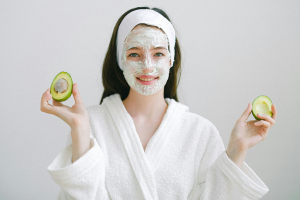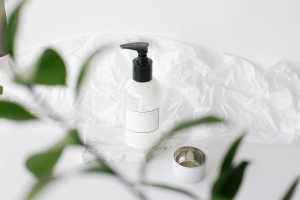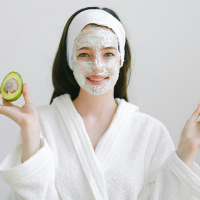
In today’s fast-paced world, it’s easy to get caught up in the latest beauty trends and products. However, when it comes to taking care of your skin, simplicity and natural ingredients are key. While a morning and evening skincare routine and the right products can pamper your skin, every skin is unique and has different needs. A beauty routine based on natural and organic cosmetics can help nourish your skin with minimal impact on the environment. In this guide, NATRUE take you through the steps of a simple yet effective beauty routine, highlighting the ingredients to look for and those that can be avoided.
How to perform a proper skincare routine?
- Cleansing: Healthy skin always starts with a clean base. Start your beauty routine with a gentle cleanser that removes dirt and impurities without stripping your skin of its natural lipids. Look for cleansers that contain gentle surfactants[1] like coco-glucoside, protective vegetable oils like sesame and jojoba, and moisturizing agents like aloe vera, which can help soothe and hydrate the skin.
Bonus tip: Exfoliating your skin 1-2 times a week with natural exfoliants like oatmeal or kaolin can help remove dead skin cells and reveal a smoother complexion. - Toning: After cleansing, use a natural toner to balance your skin’s pH levels and prepare it for the next steps. Toner revitalises skin tissues and acts as a sebum regulator, with a skin tightening and firming effect. Lavander, rosemary, and rose water are popular natural toners that can help balance and prepare the skin for nutrient absorption.
Bonus tip: If you have oily skin, you can add witch hazel water, which is astringent and will help tighten skin pores. - Serum: Serums contain higher concentrations of active ingredients, especially hydrophilic ones that penetrate deeply. For this reason, a small amount is sufficient. Unlike moisturizers, they have a lighter consistency due to their water-based formula. They are quickly absorbed and should be followed by a moisturizing cream immediately afterward, which restores the skin’s lipid protective barrier.
Bonus tip: If you want to focus your care on the eye contour area, use a light gel in the morning (even as a makeup base), and a richer eye cream at night. - Moisturizing. Finish your routine with a nourishing moisturiser that locks in moisture and acts on your epidermis. Unlike serums, they are thicker because they contain more emollient lipids and waxes – smoothing and moisture-enhancing substances used to prevent or treat dry, rough, flaky or itchy skin – and less water. Their formulas contain active ingredients such as vitamin C and E, hyaluronic acid and bakuchiol to maintain the skin hydrated. These products are meant to preserve the skin’s protective function to reduce its vulnerability to free radicals, environmental toxins and damage caused by unhealthy lifestyle habits.
Bonus tip: Always use a cream suitable for your skin type! Look for dense creams with vegetable oils like argan or shea butter if you have dry or sensitive skin; fluid creams with lighter oils like jojoba and sunflower if you have combination skin; and “oil-free” lotions if you have oily skin. - Sun protection: Don’t forget to protect your skin from the damage of the sun’s UV rays. Choose a natural sunscreen containing zinc oxide or titanium dioxide, which provide broad-spectrum protection without using (synthetic) chemical UV filters.
So, what ingredients can you focus on?
 When buying natural and organic cosmetics, it is important to be aware of ingredients that meet our skin and may also have an impact on the environment. Looking for certifications such as NATRUE is a good tool to be sure of your purchasing decision, as all NATRUE-certified products have undergone an independent certification process, which means that an external accredited organization has verified that the product meets the strict NATRUE criteria.
When buying natural and organic cosmetics, it is important to be aware of ingredients that meet our skin and may also have an impact on the environment. Looking for certifications such as NATRUE is a good tool to be sure of your purchasing decision, as all NATRUE-certified products have undergone an independent certification process, which means that an external accredited organization has verified that the product meets the strict NATRUE criteria.
When the NATRUE label is on products, the focus is on natural (or organic) renewable raw materials that are sustainably sourced and have low environmental impact, such as:
- Preservatives: only nature-identical preservatives approved by NATRUE such as benzoic acid and sorbic acid, which can be found in NATRUE-certified cosmetics. Preservatives like parabens are not approved for use.
- Alternatives to silicones: There are many plant-based and eco-friendly alternatives, such as Jojoba Oil, Coco-Caprylate, Corn Starch, carob seed powder (Ceratonia Siliqua Gum), accepted by NATRUE that can perform the various functions (emollient, skin conditioning, film-forming, silkening, etc.) carried out by silicones (e.g., dimethicone) which are often poorly biodegradable.
- Plant oils: Mineral oils (e.g., paraffinum liquidum, microcrystalline wax) can be easily replaced by vegetable oils, butters and waxes (e.g., olive oil, almond oil, shea butter, candelilla wax), which have excellent skin compatibility, are renewable and less impactful on the environment, and can be used in a diverse range of skincare, hair care and make-up products.
- Natural fragrances: consistent with consumer expectations, fragrance blends must not only conform to the label criteria but only natural aromatic raw materials, like essential oils and other plant extracts (e.g., rose, lavender, cinnamon, mint, patchouli, etc.) are accepted by NATRUE as opposed to synthetic alternatives such as ethyl methoxycinnamate and phthalates.
- Natural origin: A genetically modified organism (GMO) is any organism (apart from human beings) in which the genetic material has been altered in a way that does not occur naturally by mating and/or natural recombination. GMOs and ingredients produced from them are prohibited in natural and organic cosmetics certified under the NATRUE Label.
- Biodegradability: insoluble microbeads and microplastics can be replaced by various natural (vegetable or inorganic mineral) alternatives for the exfoliating function (e.g., flours, kaolin, salt, ground shells or kernels, coffee, etc.) or for the pearlescent effect (e.g., mica, even in combination with inorganic mineral pigments like metal oxides). Equally, surfactants used in certified products for cleansing must be completely biodegradable to ensure they can be returned to the natural circle without causing any problems.
By following a beauty routine based on natural and organic cosmetics, you can nourish your skin with ingredients that are effective and have less impact on the environment. Look for the NATRUE seal on cosmetics if you want to choose products that match your skincare goals and support your values towards naturalness and sustainability. A comprehensive list of truly natural and organic cosmetics can be found here.
[1] https://cosmetics.specialchem.com/selection-guide/selection-guide-cleansing-hair-and-skin

Article written by Paula Gómez de Tejada, NATRUE Communications Officer, and Diana Malcangi, NATRUE Scientific and Regulatory Consultant. It was originally published on Bio Eco Actual’s website (available in English, Spanish, and Catalan)



 Deutsch
Deutsch
 Español
Español
 Français
Français
 Italiano
Italiano